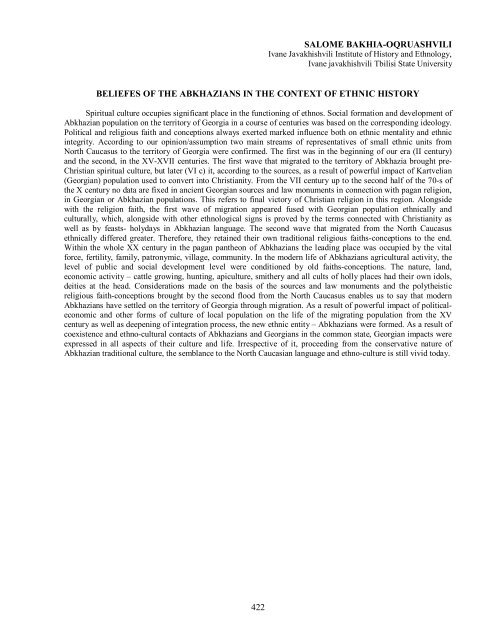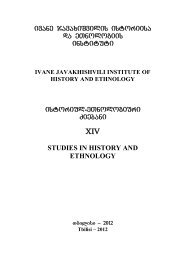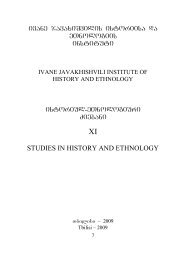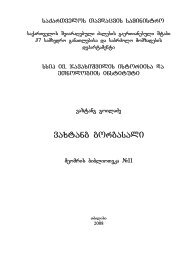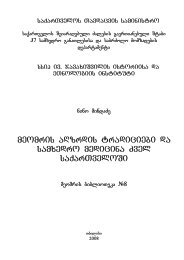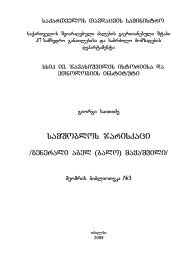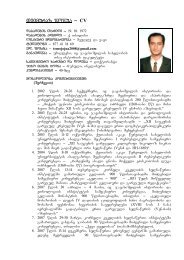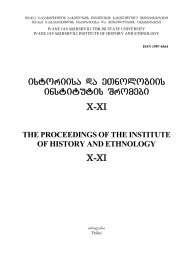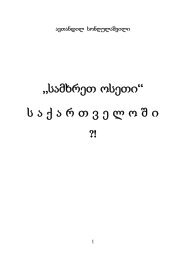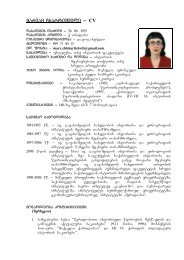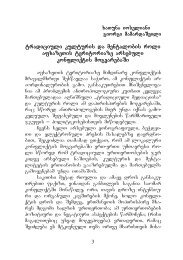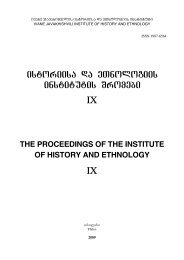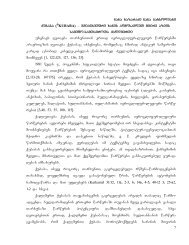axali da uaxlesi istoria
axali da uaxlesi istoria
axali da uaxlesi istoria
You also want an ePaper? Increase the reach of your titles
YUMPU automatically turns print PDFs into web optimized ePapers that Google loves.
SALOME BAKHIA-OQRUASHVILI<br />
Ivane Javakhishvili Institute of History and Ethnology,<br />
Ivane javakhishvili Tbilisi State University<br />
BELIEFES OF THE ABKHAZIANS IN THE CONTEXT OF ETHNIC HISTORY<br />
Spiritual culture occupies significant place in the functioning of ethnos. Social formation and development of<br />
Abkhazian population on the territory of Georgia in a course of centuries was based on the corresponding ideology.<br />
Political and religious faith and conceptions always exerted marked influence both on ethnic mentality and ethnic<br />
integrity. According to our opinion/assumption two main streams of representatives of small ethnic units from<br />
North Caucasus to the territory of Georgia were confirmed. The first was in the beginning of our era (II century)<br />
and the second, in the XV-XVII centuries. The first wave that migrated to the territory of Abkhazia brought pre-<br />
Christian spiritual culture, but later (VI c) it, according to the sources, as a result of powerful impact of Kartvelian<br />
(Georgian) population used to convert into Christianity. From the VII century up to the second half of the 70-s of<br />
the X century no <strong>da</strong>ta are fixed in ancient Georgian sources and law monuments in connection with pagan religion,<br />
in Georgian or Abkhazian populations. This refers to final victory of Christian religion in this region. Alongside<br />
with the religion faith, the first wave of migration appeared fused with Georgian population ethnically and<br />
culturally, which, alongside with other ethnological signs is proved by the terms connected with Christianity as<br />
well as by feasts- holy<strong>da</strong>ys in Abkhazian language. The second wave that migrated from the North Caucasus<br />
ethnically differed greater. Therefore, they retained their own traditional religious faiths-conceptions to the end.<br />
Within the whole XX century in the pagan pantheon of Abkhazians the leading place was occupied by the vital<br />
force, fertility, family, patronymic, village, community. In the modern life of Abkhazians agricultural activity, the<br />
level of public and social development level were conditioned by old faiths-conceptions. The nature, land,<br />
economic activity – cattle growing, hunting, apiculture, smithery and all cults of holly places had their own idols,<br />
deities at the head. Considerations made on the basis of the sources and law monuments and the polytheistic<br />
religious faith-conceptions brought by the second flood from the North Caucasus enables us to say that modern<br />
Abkhazians have settled on the territory of Georgia through migration. As a result of powerful impact of politicaleconomic<br />
and other forms of culture of local population on the life of the migrating population from the XV<br />
century as well as deepening of integration process, the new ethnic entity – Abkhazians were formed. As a result of<br />
coexistence and ethno-cultural contacts of Abkhazians and Georgians in the common state, Georgian impacts were<br />
expressed in all aspects of their culture and life. Irrespective of it, proceeding from the conservative nature of<br />
Abkhazian traditional culture, the semblance to the North Caucasian language and ethno-culture is still vivid to<strong>da</strong>y.<br />
422


